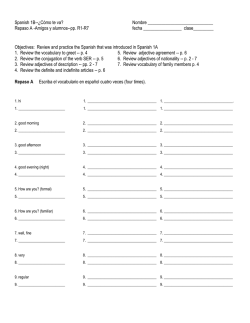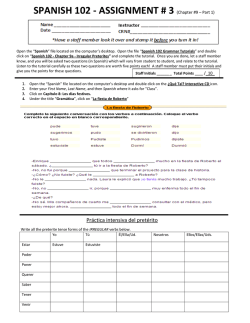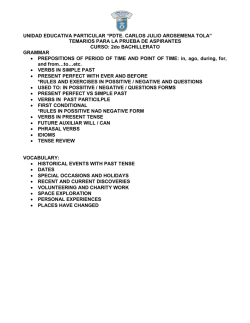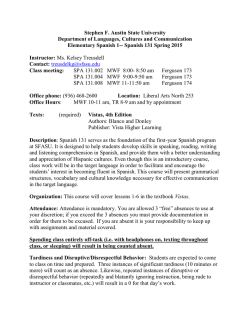
Spanish II Summer Assignment
Spanish II Summer Assignment ¡Práctica Español durante el verano! ¡Disfrútalo, mejóralo, y documéntalo! Exposure to foreign language outside of the classroom is critical. The purpose of this “assignment” is to find entertaining ways to experience Spanish. The challenge is to discover authentic material that will motivate you to stay engaged. Find something you are passionate about! It may be music, fashion, travel, culture, literature, celebrities, movies, art, sports, or cooking. The summer assignment focuses on the three modes of communication: Interpretive: How well you understand Spanish through reading and listening. ● Reading: newspapers, books, magazines, etc. ● Listening: TV stations, movies, radio stations, native speakers, etc. Presentational: How you communicate your thoughts in Spanish. ● Writing: essays on topics that interest you: education, health, sports, technologies, music, etc. ● Speaking: make a 1-‐minute presentation about a topic that motivates you: a movie review, etc. Interpersonal: How well you can carry on a conversation with one or more people. ● ● “On-‐demand” Spanish speaking: practice dialogues, debates, interviews, Skype, phone calls, etc. Writing: letters, e-‐mails, chats, Facebook, etc. As you practice the three modes of communication you will also apply important elements of Spanish grammar and vocabulary. This will increase and improve your Spanish proficiency, enhance your personal enjoyment of Spanish speaking, provide confidence about taking your AP exam, and save you money on your college degree. Assignment: Complete and document the following using the checklist found in the back of this packet. Lecturas (Interpretive): Minimum 2 summaries (5 puntos para cada uno) Using the documentation sheet provided, read anything in Spanish and count it. Your documentation must provide the name of the source or website, title, date, and a summary in English that will illustrate that you read and understood the article or story. Use the resources below to get you started. Possible Resources: ✓ www.prensaescrita.com (periódicos) ✓ http://www.bbc.co.uk/mundo (periódicos) ✓ www.hola.es (revistas) ✓ www.pronto.es (revistas) ✓ www.diezminutos.es (revistas) ✓ Spanish books from the Public library ✓ Children’s books online Escuchar (Interpretive): Minimum 3 summaries (5 puntos para cada uno) Using the documentation sheet provided, listen to anything in Spanish that interests you. Your documentation must provide the name of the sources or website, title, date, and a summary that will illustrate that you read and understood the speaking. Get creative here! You can use songs, movies, radio, or listen to native speakers having conversations. Escribir (Presentational): 15 sentence essay (15 puntos) ¿Qué hiciste durante este verano? ● ¿Qué hiciste este verano? ● ¿Cenaste en un restaurante especial? ● ¿Adónde fuiste? ● ¿Qué pediste allá? ● ¿Visitaste en alguna parte especial? ● ¿Fuiste de compras antes comenzó la ● ¿Trabajaste? escuela? ● ¿Saliste con tus amigos? ● ¿Qué compraste en el central ● ¿Qué hicieron tú y tus amigos? comercial? This is a presentational communication piece. Use rich and precise vocabulary, grammar, and a wide variety of preterite verbs. Hablar (Presentational): Presentational speaking (5 puntos) Prepare at least a 1 minute presentation in Spanish about your summer for the first week of school. You will present this to the class with no paper. You may use your presentational writing piece (the 15 sentence essay) as a guide to help you prepare this presentation. Hablar (Interpersonal): Interpersonal speaking (10 puntos) After each presentation, one person will be chosen to ask the presenter a question about their presentation (5 pts). Be prepared to answer questions about your presentation on the spot (5 pts). Gramática: Grammar practice (http://www.studyspanish.com/tutorial.htm) (10 puntos) www.studyspanish.com: Look through grammar units 1-‐6 on studyspanish.com and identify what you need to improve. Complete 10 basic quizzes and mini tests that provide practice in that area. Print a copy of your studyspanish.com report card to provide evidence of the lessons, dates, and scores. ● Regular Verbs (#s 8-‐10) ● Ser and Estar (#s 15-‐18) ● Stem-‐Changing Verbs (#s 28-‐30) ● Ir + a with Infinitives (#s 32) ● Direct Object Pronouns (#s 41-‐43) ● Present Progressive (#s 49) ● Verbs with Irregular 1st Persons (#s 50) ● Preterite Tense (go to http://personal.colby.edu/~bknelson/SLC/preterite.php) *If you choose to complete this lesson, please print the page that shows your answers once you have completed the assignment. Verbos: Verb chart conjugations (10 puntos por cada página) Conjugate the verbs given on the attached verb chart (a separate download) in the tenses given. You may practice the verb tenses on www.conjugemos.com. Vocabulario: Vocabulary practice (quizlet) (5 puntos para cada exámen) www.quizlet.com: Go to www.quizlet.com and search for the vocabulary lists under our next textbook: Descubre Level 1 Lección 7, 8, 9. (If you type in “Descubre Level 1” and the number of the lesson, it will help you narrow your search). Complete tests for 3 lessons and print the first page of test results that shows your score and dates as evidence. In order to do well on your next level of Spanish, we want to continually improve our Spanish communication skills. By working over the summer, we can hit the ground running when the new school year begins. Have a great summer! ¡Tenemos muchas ganas de trabajar con ustedes en el próximo curso! Sra. Call, Sra. Maley, Sra. Wehry [email protected] [email protected] [email protected] Lectura 1 – Documentation Sheet Fuente (source) Título Fecha Tiempo gastado Describe what you read in Spanish: who, what when, where, why, how? What new words did you learn from the reading? (Provide the Spanish and English) What did you notice about the Hispanic culture? Lectura 2 – Documentation Sheet Fuente (source) Título Fecha Tiempo gastado Describe what you read in Spanish: who, what when, where, why, how? What new words did you learn from the reading? (Provide the Spanish and English) What did you notice about the Hispanic culture? Escuchar 1 – Documentation Sheet Fuente (source) Título Fecha Tiempo gastado Describe what you heard in Spanish: who, what when, where, why, how? What new words did you learn from listening? (Provide the Spanish and English) What did you notice about the Hispanic culture? Escuchar 2 – Documentation Sheet Fuente (source) Título Fecha Tiempo gastado Describe what you heard in Spanish: who, what when, where, why, how? What new words did you learn from listening? (Provide the Spanish and English) What did you notice about the Hispanic culture? Escuchar 3 – Documentation Sheet Fuente (source) Título Fecha Tiempo gastado Describe what you heard in Spanish: who, what when, where, why, how? What new words did you learn from listening? (Provide the Spanish and English) What did you notice about the Hispanic culture? Escribir (Presentational): 15 sentence essay (15 puntos) ¿Qué hiciste durante este verano? ● ¿Qué hiciste este verano? ● ¿Cenaste en un restaurante especial? ● ¿Adónde fuiste? ● ¿Qué pediste allá? ● ¿Visitaste en alguna parte especial? ● ¿Fuiste de compras antes comenzó la ● ¿Trabajaste? escuela? ● ¿Saliste con tus amigos? ● ¿Qué compraste en el central ● ¿Qué hicieron tú y tus amigos? comercial? This is a presentational communication piece. Use rich and precise vocabulary, grammar, and a wide variety of preterite verbs. Checkist / Rubric for Activities ¿Completado? (check) Fecha Puntos ganados Puntos posibles Lectura 1 5 Lectura 2 5 Escuchar 1 5 Escuchar 2 5 Escuchar 3 5 Escribir 15 5 5 5 10 (1 point per quiz) Verbos – presente 10 Verbos – pretérito 10 Vocabulario (quizlet) Total Hablar (presentation) this will be done in class Hablar (interpersonal – question done in class) Hablar (interpersonal – answer-‐done in class) Grámatica (studyspanish) 15 (5 points per quiz) 100 Complete and memorize Spanish II Summer Assignment Verb Chart Nombre _______________________________________ Present Tense Verbs Verb English Yo Tú Él, ella, usted Nosotros Vosotros Ellos/as,ustedes Regular Present Tense Verbs hablar comer escribir ser Date & time, Description, Occupation, Origin, Ownership (Permanent) ser estar How you feel and where you are always use the word estar. Plus present progressive (Temporary) estar Present Progressive –ing words that are used with estar and are happening at the moment. (-‐ar:ando -‐er,-‐ir:iendo) andar llover conducir Irregulars To know; be conocer acquainted with dar ir + a oír saber To know information /how to do something ver Irregular “go” Verbs conseguir e:i decir e:i hacer poner salir seguir e:i suponer tener e:ie traer venir e:ie Preterite Tense Verbs Verb English Yo Tú Él, ella, usted Nosotros Vosotros Ellos/as,ustedes Regular Preterite Tense Verbs: -ar: é, aste, ó, amos, asteis, aron, -er: í, iste, ió, imos, isteis, ieron, -ir: í, iste, ió, imos, isteis, ieron *2 have accents despertar vender escribir Spell changing Preterite: -gar verbs – g changes to gu, -zar verbs – z changes to c, -car verbs – c changes to qu *in 1st.person only **2 have accents jugar * abrazar * buscar * rd Preterite stem changing –ir verbs only: e:i or o:u *sandal verbs: change in 3 person singular and plural *2 have accents preferir e:i * * dormir o:u * * rd “Y” verbs in the Preterite change “i” to a “y” in the 3 person singular and plural *5 have accents caer * * leer * * oír * * Irregular Preterite stem spelling change: e iste o imos isteis ieron andar anduv Estar estuv To manage/to succeed Poder pud Hacer hic *hiz Poner pus to find out/ to learn Saber sup Tener tuv To w ant o r l ove Querer quis Irregular Preterite Ver & Dar i, iste, io, imos, isteis, ieron *no accents Ver v Dar d Irregular Preterite Ser and ir (no Accents) Since preterite forms are identical, context clarifies which of the two verbs is being used. *no accents Ser Ir +a “J” verbs in the Preterite most verbs end in –cir change c to “j” then: e iste o imos isteis eron Note: omit “i” in 3rd person plural *no accents conducir traducir traer
© Copyright 2026



